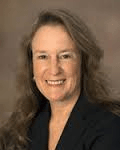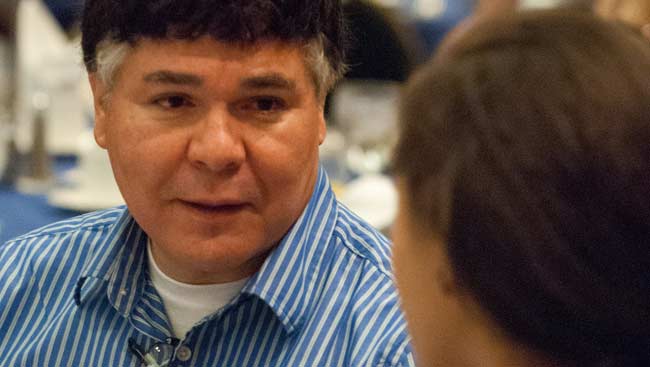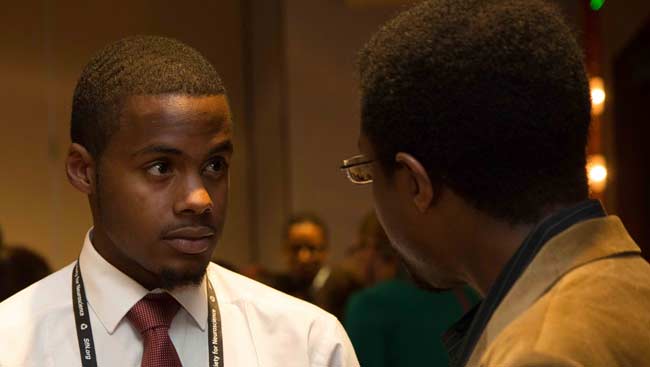Tips for Mentoring the Next Generation
- Featured in:
- Best Practices for Mentoring Relationships
May 08, 2015
This resource was featured in the NeuroJobs Career Center. Visit today to search the world’s largest source of neuroscience opportunities.
How can mentors best adapt their advice to a changing field and prepare the next generation of neuroscientists?
Experts in this video share how to:
- Tailor advice for people at different stages of a neuroscience career
- Offer advice to students pursuing careers beyond the bench
- Balance mentor requests, like recommendation letters, with other obligations
- Experience the rewards of mentorship
Speakers

Michael Shadlen, PhD
Michael Shadlen studies neurons in the association cortex that transform information from the sensory cortex to give rise to interpretations, decisions, and plans for behavior. His experiments combine electrophysiology and behavioral and computational methods to advance our knowledge of higher brain function. Michael’s research on decision making exposes the neural mechanisms that support a wide range of cognitive functions of normal brains — what it is about a normal brain that makes us “not confused.” As a practicing neurologist, Michael believes that by elucidating the principles of cognitive neuroscience employed in decision-making, we will ultimately help patients with disorders affecting a wide range of higher cognitive functions affecting personality, ideation, volition, and awareness. Michael is a professor in the department of neuroscience and part of the Kavli Institute for Brain Science at Columbia University and is an investigator at the Howard Hughes Medical Institute. He received his MD from Brown University and his PhD from the University of California, Berkeley and did his residency in neurology at Stanford University.

Anne M. Etgen, PhD
Anne M. Etgen, PhD, is currently professor emerita of neuroscience, psychiatry and behavioral sciences, obstetrics & gynecology and women’s health, and pediatrics at the Albert Einstein College of Medicine. During her career at Einstein, her research on steroid hormone action in the brain was funded by NIMH, NICHD, NINDS, NIA, and the National Science Foundation (NSF). She is a two-time MERIT awardee from NIMH and served as editor-in-chief of the journal Hormones and Behavior from 2004-2008. Etgen has also contributed to Einstein’s efforts to foster the training of faculty in the clinical and translational research arenas, working through institutional K-12 programs, the Reproductive Endocrinology and Infertility fellowship program of the Department of Obstetrics & Gynecology and Women’s Health, and as chair of the Scientific Advisory and Review Committee of Einstein’s Institute for Clinical and Translational Research. Etgen has won several awards and served on committees dedicated to training the next generation of neuroscientists and fostering diversity in the biomedical workforce. She now leads a national program called SEED (Scholarships to Enhance and Empower Diversity) aimed at enhancing the recruitment and retention of diverse early career neuroscientists into academic positions.

Marina Picciotto, PhD
Marina Picciotto is the Charles B.G. Murphy Professor of Psychiatry in the Child Study Center of Neuroscience and Pharmacology at Yale University, where she has been on the faculty since 1995. Dr. Picciotto’s research interests lie in understanding the role of molecular signaling in complex behavior, focusing on the function of acetylcholine and its receptors in learning, development, and circuit function. She received her undergraduate degree in biological sciences from Stanford University and her PhD in Molecular Neurobiology from Rockefeller University. She completed her postdoctoral training at the Institute Pasteur in Paris.

Freda Miller, PhD
Freda Miller is senior scientist and professor at the Hospital for Sick Children Research Institute and the University of Toronto. She is a Canada Research Chair in developmental neurobiology and an elected fellow of the Royal Society of Canada and the American Association for the Advancement of Science. She was previously secretary of SfN and president of the International Society for Developmental Neuroscience. She is interested in development and repair of the nervous system and is best known for her studies of neural and dermal stem cells and of neuronal growth, survival, and apoptosis. She obtained her BSc degree in biochemistry at the University of Saskatchewan, Saskatoon, and her PhD degree in medical sciences from the University of Calgary, Alberta. She completed her postdoctoral training at the Scripps Research Foundation. She then held faculty positions at the University of Alberta, Edmonton, and the Montreal Neurological Institute at McGill University, Quebec. Dr. Miller was a Howard Hughes Medical Institute international research scholar from 2007 to 2011.

Nicholas Spitzer, PhD
Nicholas Spitzer, PhD, is the Atkinson Family Distinguished Professor within the neurobiology department at the University of California, San Diego (UCSD) and president of SfN. He has served as chair of his department multiple times, co-chair and chair of the UCSD Academic Senate, and co-chair of the Task Force to Promote Establishment of the Preuss Charter School at UCSD. Spitzer received his PhD in neurobiology from Harvard University.

Carol Barnes, PhD
Carol Barnes is a Regents’ Professor in the departments of psychology and neurology, and is the Evelyn F. McKnight Endowed Chair for Learning and Memory in Aging at the University of Arizona. Barnes is a past president of SfN, an elected fellow of the American Association for the Advancement of Science, and an elected foreign member of the Royal Norwegian Society of Sciences and Letters. Her research program seeks to understand how the brain changes during the aging process and what the functional consequences of these changes are on information processing and memory in the elderly. She also participates in several underrepresented minority training programs, including the McNair Achievement Program, Minority Access to Research Careers, and NIH’s Disadvantaged High School Student Research Program.

Leslie Tolbert, PhD
As a neuroscience faculty member for more than 30 years, first at Georgetown University and then at the University of Arizona (UA), Leslie P. Tolbert has been active in teaching and research, including generating grant support and writing papers for scientific journals, and also in community outreach, speaking with grade-school students and community groups. Leslie served as UA's vice president for research from 2005 to 2013. In this role, she worked with scholars across the campus and shared the importance of their work with potential funders, legislators, business leaders, and citizens, locally, nationally, and internationally. Leslie twice presented testimony to U.S. House of Representatives Committee on Science and Technology subcommittee.

Sumantra Chattarji, PhD
Sumantra Chattarji is a professor at the National Centre for Biological Sciences, part of the Tata Institute of Fundamental Research. Sumantra received his MSc in physics from the Indian Institute of Technology, Kanpur. He then earned a PhD in neuroscience, under the supervision of Professor Terry Sejnowski, at Johns Hopkins University and the Salk Institute. After post-doctoral research at Yale University and MIT, he started his own laboratory at the National Centre for Biological Sciences, Bangalore, India in 1999. His research has shown that prolonged stress leaves its mark by enhancing both the physiological and structural basis of synaptic connectivity in the amygdala, thereby triggering the emotional symptoms observed in stress-related psychiatric disorders. His lab also studies synaptic defects and their reversal in Fragile X Syndrome, the leading identified cause of autism. His collaborators include Professor Bruce McEwen at Rockefeller University and Professor Susumu Tonegawa, a Nobel laureate at MIT. Dr. Chattarji was awarded the International Senior Research Fellowship by the Wellcome Trust and the Vision 2008 Award by the Fragile X Research Foundation. He is on the editorial board of several international journals and is a member of various policy-making committees of international societies related to neuroscience. He is also the director of the recently established Center for Brain Development and Repair at The Institute for Stem Cell Biology and Regenerative Medicine in Bangalore.

Frances Jensen, MD, PhD
Frances E. Jensen is an associate professor of neurology at Harvard Medical School and director of epilepsy research at Boston Children's Hospital. She serves on many advisory boards for private and public research foundations, is a past chair of SfN’s Program Committee, and is a past chair of the Council of Medical Education of the American Epilepsy Society where she made important contributions to professional training. Among other honors, Jensen has received the First Award from NIH and was the 2003 Lennox Lecturer at the American Epilepsy Society Meeting.
4 of 5 articles left
Login
or
Become a Member
to unlock content





.png?h=1763&w=3125&la=en&hash=B2439C2768576BED6405672E5CD5CF8CB1AA375F)




